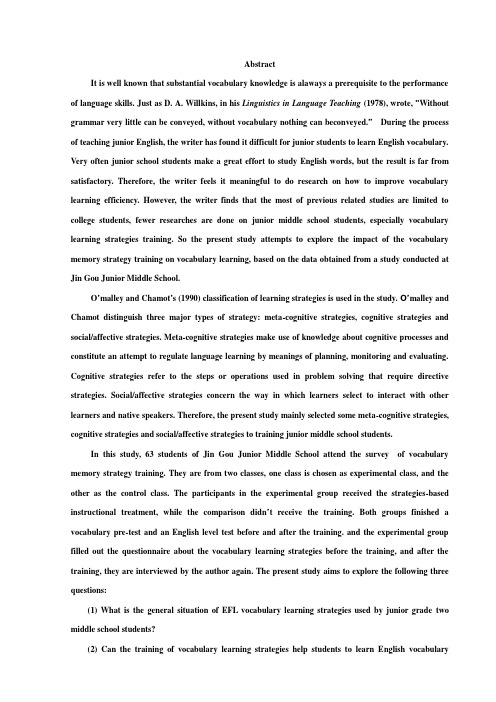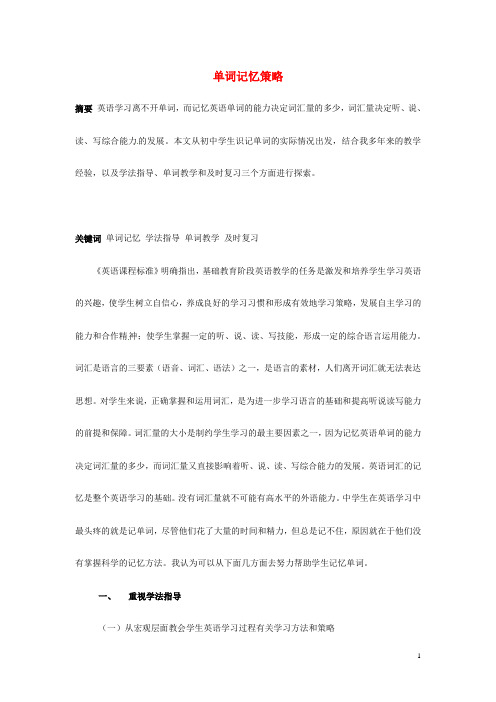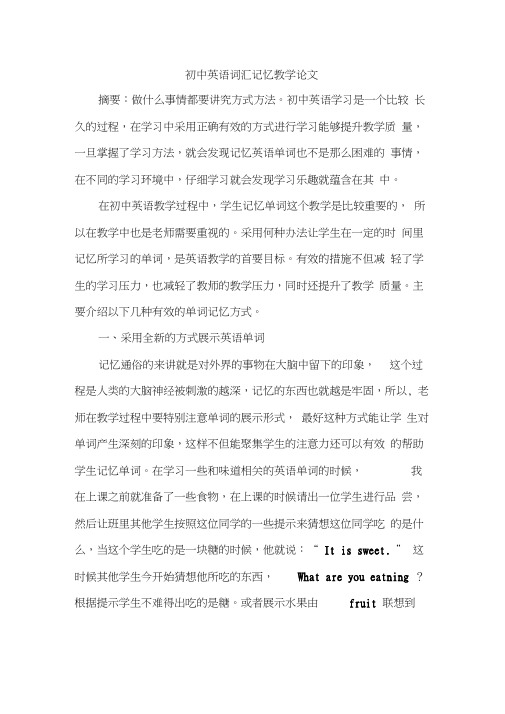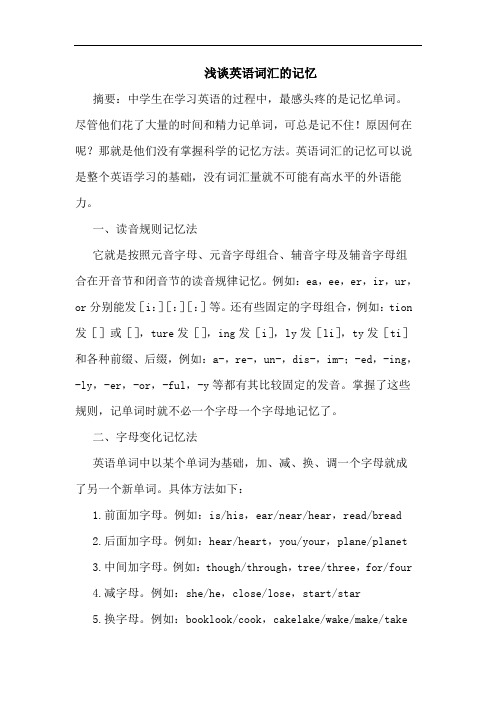初中英语单词记忆法论文
论文:中学英语词汇记忆策略

AbstractIt is well known that substantial vocabulary knowledge is alaways a prerequisite to the performance of language skills. Just as D. A. Willkins, in his Linguistics in Language Teaching (1978), wrote, “Without grammar very little can be conveyed, without vocabulary nothing can beconveyed.”During the process of teaching junior English, the writer has found it difficult for junior students to learn English vocabulary. Very often junior school students make a great effort to study English words, but the result is far from satisfactory. Therefore, the writer feels it meaningful to do research on how to improve vocabulary learning efficiency. However, the writer finds that the most of previous related studies are limited to college students, fewer researches are done on junior middle school students, especially vocabulary learning strategies training. So the present study attempts to explore the impact of the vocabulary memory strategy training on vocabulary learning, based on the data obtained from a study conducted at Jin Gou Junior Middle School.O’malley and Chamot’s (1990) classification of learning strategies is used in the study. O’malley and Chamot distinguish three major types of strategy: meta-cognitive strategies, cognitive strategies and social/affective strategies. Meta-cognitive strategies make use of knowledge about cognitive processes and constitute an attempt to regulate language learning by meanings of planning, monitoring and evaluating. Cognitive strategies refer to the steps or operations used in problem solving that require directive strategies. Social/affective strategies concern the way in which learners select to interact with other learners and native speakers. Therefore, the present study mainly selected some meta-cognitive strategies, cognitive strategies and social/affective strategies to training junior middle school students.In this study, 63 students of Jin Gou Junior Middle School attend the survey of vocabulary memory strategy training. They are from two classes, one class is chosen as experimental class, and the other as the control class. The participants in the experimental group received the strategies-based instructional treatment, while the comparison didn’t receive the training. Both groups finished a vocabulary pre-test and an English level test before and after the training. and the experimental group filled out the questionnaire about the vocabulary learning strategies before the training, and after the training, they are interviewed by the author again. The present study aims to explore the following three questions:(1) What is the general situation of EFL vocabulary learning strategies used by junior grade two middle school students?(2) Can the training of vocabulary learning strategies help students to learn English vocabularyeffectively?(3) How does the English vocabulary strategies training influence English achievements?This thesis is divided into five chapters:chapter One is the thesis introduction, which briefly presents the orientation, the background and objectives of the study, and it introduces the research questions of the study, the theoretical and practical significance of the research. Chapter Two is a literature review. Some previous relevant existing literatures are reviewed in this part to indicate the background of researches about language learning strategies, vocabulary learning strategies and vocabulary learning strategy training. Chapter Three presents the main theoretical framework. The cognitive structure theory, rules of memory, the reasons of forgetting and attention are presented in this chapter. In addition to the information processing model and depth of information processing are provided in this chapter. Chapter Four presents the research methodology, which gives a detailed account of participants, setting, research instruments, the procedure of training. Chapter Five presents the results of the questionnaire, two vocabulary tests, an English proficiency test, oral interviews and the interpretation of the corresponding findings. Chapter Six is the conclusion, which discusses the research findings, pedagogical implications, limitations and prospects of this study.The result of the study shows that the junior students’ average use of vocabulary learning is at a very low level, they mainly use the mechanical repetition. However, the vocabulary memory strategy training is effective to vocabulary learning. According to the interview, the training was helpful for students to improve not only their efficiency of vocabulary learning but also their confidence and interesting of learning English. However, the influence of training on general English proficiency level is not so much as vocabulary learning.Key words: Junior School Students, English Vocabulary, Memory Strategy, Vocabulary Memory Strategies Training中文摘要众所周知,大量的词汇知识是语言技能的先决条件。
初中英语教师教学论文 单词记忆策略

单词记忆策略摘要英语学习离不开单词,而记忆英语单词的能力决定词汇量的多少,词汇量决定听、说、读、写综合能力的发展。
本文从初中学生识记单词的实际情况出发,结合我多年来的教学经验,以及学法指导、单词教学和及时复习三个方面进行探索。
关键词单词记忆学法指导单词教学及时复习《英语课程标准》明确指出,基础教育阶段英语教学的任务是激发和培养学生学习英语的兴趣,使学生树立自信心,养成良好的学习习惯和形成有效地学习策略,发展自主学习的能力和合作精神;使学生掌握一定的听、说、读、写技能,形成一定的综合语言运用能力。
词汇是语言的三要素(语音、词汇、语法)之一,是语言的素材,人们离开词汇就无法表达思想。
对学生来说,正确掌握和运用词汇,是为进一步学习语言的基础和提高听说读写能力的前提和保障。
词汇量的大小是制约学生学习的最主要因素之一,因为记忆英语单词的能力决定词汇量的多少,而词汇量又直接影响着听、说、读、写综合能力的发展。
英语词汇的记忆是整个英语学习的基础。
没有词汇量就不可能有高水平的外语能力。
中学生在英语学习中最头疼的就是记单词,尽管他们花了大量的时间和精力,但总是记不住,原因就在于他们没有掌握科学的记忆方法。
我认为可以从下面几方面去努力帮助学生记忆单词。
一、重视学法指导(一)从宏观层面教会学生英语学习过程有关学习方法和策略英语学习过程中熟记单词的“八字”法则。
“眼到、口到、手到、心到”八字法则。
“眼到、口到、手到、心到”八字法则,是就英语学习过程中的英语学习方法而论的。
它不仅实用于整体英语学习,而且实用于单词记忆。
他是学生在学习英语中的几个步骤、几大环节。
特别对单词记忆是十分适用的。
“眼到”,即在单词记忆的过程中,集中学生的注意力,让学生的眼睛专注在所学的英语单词上。
建立一个形象直观的“第一印象”。
这是学好单词的第一歩。
“口到”即在记忆单词的过程中务必开口发音,高声朗读,做到朗朗有声,念念有词。
“口到”是对学生语感能力的培养。
初中英语词汇记忆教学论文

初中英语词汇记忆教学论文
摘要:做什么事情都要讲究方式方法。
初中英语学习是一个比较长久的过程,在学习中采用正确有效的方式进行学习能够提升教学质量,一旦掌握了学习方法,就会发现记忆英语单词也不是那么困难的事情,在不同的学习环境中,仔细学习就会发现学习乐趣就蕴含在其中。
在初中英语教学过程中,学生记忆单词这个教学是比较重要的,所以在教学中也是老师需要重视的。
采用何种办法让学生在一定的时间里记忆所学习的单词,是英语教学的首要目标。
有效的措施不但减轻了学生的学习压力,也减轻了教师的教学压力,同时还提升了教学质量。
主要介绍以下几种有效的单词记忆方式。
一、采用全新的方式展示英语单词
记忆通俗的来讲就是对外界的事物在大脑中留下的印象,这个过程是人类的大脑神经被刺激的越深,记忆的东西也就越是牢固,所以, 老师在教学过程中要特别注意单词的展示形式,最好这种方式能让学生对单词产生深刻的印象,这样不但能聚集学生的注意力还可以有效的帮助学生记忆单词。
在学习一些和味道相关的英语单词的时候,我在上课之前就准备了一些食物,在上课的时候请出一位学生进行品尝,然后让班里其他学生按照这位同学的一些提示来猜想这位同学吃的是什么,当这个学生吃的是一块糖的时候,他就说:“ It is sweet. ” 这时候其他学生今开始猜想他所吃的东西,What are you eatning ?根据提示学生不难得出吃的是糖。
或者展示水果由fruit 联想到。
初中英语单词背记法 科研论文

课改教学中的英语单词记忆法现今的社会,英语的地位也越来越突出。
学好英语也成为广大学生、家长和老师的共同心愿。
而学单词是学英语的基础,是学英语的必经之路。
记不住单词就意味着学英语之路走不通,学生学不会单词就会掉队。
尤其在课程改革的今天,如何让学生快速、有效、长期的记忆单词则成为广大师生和家长最为关心的问题。
因此能巧妙的记忆单词则成为突破英语的关键,教师在教学过程中应教给学生一些记忆单词的方法,让学生能快记、乐记、长记不忘。
下面就介绍几种简单有效的英语单词的记忆方法。
一. 语境记忆法记忆英语单词与环境有关。
记忆和理解英语单词的时候,我们要利用“环境因素”的“暗示”,随后又在不断地学习应用过程中逐步摆脱这些“环境因素”的“暗示”,达到抽象的记忆和理解。
而且即使已经记住的生词,也只是在特定的环境里才知道其意义,环境一变,似乎又成了生词。
比方说,从某一课里学到了一个生词,而且确实记住了,如果把它放到另一新课程,可能会得陌生。
因此,要想熟练地掌握英语单词,还必须要在各种语境下记忆。
不管主观上是否意识到这一点,这是我们每个人记忆英语单词时实际上走的一条曲折的路,千万不以因短期内记不住而灰心丧气。
例如:“get away”作“离开、滚开”解,“get through”作“到达、打通”解,“get up”作“起床、登上”解等。
脑子里有了这么多对于get这上单词意义的理解时,别人猛一问get这个英语单词何意时,还不一定马上回答出来。
但是这个单词与其它单词组合在一起,在不同语境在不同语境里出现时,却都能随机应变地正确解释它。
只有到了这种境界,才能说明对英语单词意义的理解比较广泛,英语水平提高了。
二. 读音规则记忆法英语是拼音文字,根据英语这一特点,使语音与单词中的字母有机的结合来记忆单词。
国际音标是标识标记英语语音的符号系统。
如果熟悉并掌握国际音标及字母、字母组合的发音规则,就可以根据音标来直接拼写英语单词,尤其是一些比较长又难于识记的单词。
记忆词汇的英语作文初一

记忆词汇的英语作文初一Title: Strategies for Improving Vocabulary Retention。
Vocabulary acquisition is a crucial aspect of language learning. As a beginner in English, it's essential to adopt effective strategies to remember new words. In this essay, I will discuss several methods to help you enhance your vocabulary retention.Firstly, repetition is key. When you encounter a new word, make sure to repeat it several times both orally and in writing. Create flashcards with the word on one side and its definition on the other. Review these flashcards regularly to reinforce your memory of the word.Secondly, contextual learning is highly beneficial. Instead of memorizing words in isolation, try to understand them within the context of sentences or passages. Reading extensively in English can help you encounter new words in various contexts, making it easier to remember theirmeanings.Furthermore, association is a powerful mnemonic technique. Try to associate new words with familiar concepts or images. For example, if you're learning the word "exquisite," imagine a beautifully decorated cake and associate the word with its elegance and beauty.Another effective method is word families. Many English words are related to each other through common roots, prefixes, or suffixes. By learning word families, you can expand your vocabulary more efficiently. For instance, if you know the word "happy," you can easily understand words like "happiness," "unhappy," and "happily."Moreover, practical application is essential for retaining vocabulary. Try to use newly learned words in your conversations, writing, and daily activities. The more you incorporate these words into your daily life, the more likely you are to remember them.In addition to these strategies, mnemonics can behelpful for remembering particularly challenging words. Create acronyms, rhymes, or funny stories to associate with difficult words, making them easier to recall.Furthermore, technology can be a valuable tool for vocabulary retention. There are numerous apps and online resources designed specifically for language learners, offering interactive exercises, quizzes, and games to help you practice and remember new words.Lastly, patience and perseverance are crucial. Remember that vocabulary acquisition is a gradual process, and it's normal to forget words from time to time. Be patient with yourself and continue practicing regularly.In conclusion, improving vocabulary retention requires a combination of repetition, contextual learning, association, word families, practical application, mnemonics, technology, and patience. By employing these strategies consistently, you can enhance your English vocabulary effectively and become a more proficient language learner.。
英语词汇记忆论文

浅谈英语词汇的记忆摘要:中学生在学习英语的过程中,最感头疼的是记忆单词。
尽管他们花了大量的时间和精力记单词,可总是记不住!原因何在呢?那就是他们没有掌握科学的记忆方法。
英语词汇的记忆可以说是整个英语学习的基础,没有词汇量就不可能有高水平的外语能力。
一、读音规则记忆法它就是按照元音字母、元音字母组合、辅音字母及辅音字母组合在开音节和闭音节的读音规律记忆。
例如:ea,ee,er,ir,ur,or分别能发[i:][:][:]等。
还有些固定的字母组合,例如:tion 发[]或[],ture发[],ing发[i],ly发[li],ty发[ti]和各种前缀、后缀,例如:a-,re-,un-,dis-,im-;-ed,-ing,-ly,-er,-or,-ful,-y等都有其比较固定的发音。
掌握了这些规则,记单词时就不必一个字母一个字母地记忆了。
二、字母变化记忆法英语单词中以某个单词为基础,加、减、换、调一个字母就成了另一个新单词。
具体方法如下:1.前面加字母。
例如:is/his,ear/near/hear,read/bread2.后面加字母。
例如:hear/heart,you/your,plane/planet3.中间加字母。
例如:though/through,tree/three,for/four4.减字母。
例如:she/he,close/lose,start/star5.换字母。
例如:booklook/cook,cakelake/wake/make/take6.调字母(即改变字母顺序)。
例如:blow/bowl,sing/sign,from/form三、联想记忆法在日常生活中可以根据所处的环境,所见到、所摸到的事物,联想相关的英语单词。
例如:打球时联想到:ball,(play)basketball,(play)football,(play)volleyball,playground等等;吃饭时联想到:dining-room,(have)breakfast,(have)lunch,(have)supper等等;睡觉时联想到:bed,bedroom,gotobed,sleep,gotosleep,fallasleep等等。
英语单词记忆法论文

英语单词记忆法论文【摘要】记忆单词有方法,学生记得快,但也忘得快。
记忆单词的三大宗旨:一是贵在坚持,持之以恒最关键;二是要遵循记忆规律,坚持定期定时回头看;三是背诵的词汇要运用到听、说、读、写各方面,才能形成永久性记忆【关键词】英语单词记忆法在英语教学中,存在老师教得苦,学生学得吃力的情况,尤其是相当一部分学生过早地成了英语差生,学生怕学英语,怕上英语课。
导致这种状况的一个主要原因就是,英语单词数量庞大,学生记不住单词,影响了学生学习的兴趣。
为了让学生更好地、更轻松地学好英语,根据多年的经验,笔者本文总结了下面几种快速记忆单词的方法,供大家生学习参考。
1. 同类记忆法把同义词、近义词逐一归类,如:accept, receive;rest, break; attend,join;require,need;ill,sick;ago,before;too,also,either;every, each 等。
这样归类单词好处是:提高复现率,能常忆起学过的单词。
提高学习兴趣,持之以恒,滚雪球式地积累,会不断扩大词汇量,会快速、准确、牢固地记住英语单词。
2. 对比记忆法对比记忆是把反义词放在一起,对比记忆。
意思相反的词放在一起,会形成鲜明的对照,对大脑输入的刺激信号强于一般的信号,从而能强化记忆。
日常英语中反义词的应用相当广泛,如形容体形的 tall ,short,fat,thin;说明方位的east,west,south,north;评比判断的 good, bad, right, wrong;表示时序的 early, late, first,last;反应情绪的 pleased, angry, sad, glad;而应用反义词讲出的句子更是生动活泼,色彩鲜明,富于感染力。
3. 分类记忆法分类记忆方法多种多样,如按词义、词性、拼读规则分类等。
4. 图表记忆法图标记忆是通过视觉刺激记忆,学习者看到形象生动的标志,可加深记忆印象,利用形象的图表进行记忆,它的优点是意、形、物直观地结合到一起,你可以找一本英语图解字典作为参考。
初中英语单词记忆方法论文

初中英语单词记忆方法之我见摘要:在英语教学中,记忆单词的方法很多。
作为英语教师,要指导学生从自身实际出发,不断探索,善于总结;要教会学生记单词,帮助学生找到适合自己的高效记忆的方法,为学生的英语学习打下良好的基础。
关键词:初中英语单词单词的记忆能力决定词汇量的多少,而词汇量决定听、说、读、写综合能力的发展,所以英语单词教学,成为英语教学中关键的一环。
随着初中英语教学中三机一幕、多媒体、网络教室等普及,对英语单词的教学开辟了广阔的天地。
笔者从以下在英语教学中,借鉴当前多媒体教学、情景教学等成功经验,采取了四种方法,对初中英语单词教学进行了创新和探讨,取得了较为理想的效果。
一、拼读入门拼读入门是单词教学的关键,旨在让学生通过掌握单词的拼读规则,增强学生对单词的记忆能力,这个环节处理得好,才能为其他单词教学方法的实施奠定良好的基础。
传统教学起始阶段教学字母一般是从字母的名称教起,但英语字母的名称读音跟字母或字母组合在单词中所代表的音素是不一致的。
如bag是由3个字母组成,但学生无法把字母名称的读音跟字母或字母组合在单词中的发音联系起来,只能靠死记硬背,有的甚至靠用汉字或汉语拼音给单词注音来记忆,不少学生由于记不住单词而失去了对学习英语的兴趣和信心。
因此在教学中我尝试着改变传统教学的方法,先教字母、字母组合在单词中的发音,并根据发音规律拼读、拼写单词。
比如在教“a”这个字母时,要让学生同时知道它在重读开音节和重读闭音节中的两个最基本读音,然后把a放入单词中;如在name这个单词中,由于学生见到n就会发[n],见到m就会发[m],把a放入n与m 之间,并告诉他们“a”应发开音节的读音,学生就自然发出[neim]这个音,再强调“e”在词尾不发音。
如此训练,学生可以根据读音记忆单词,使单词记忆变得更牢固。
在具体实施教学时,初始阶段可将教材中的单音节词归纳出来,这些词必须是按照字母组合的发音规律能拼出来的。
这有利于培养学生见词就能拼读、听音就能拼写的能力。
- 1、下载文档前请自行甄别文档内容的完整性,平台不提供额外的编辑、内容补充、找答案等附加服务。
- 2、"仅部分预览"的文档,不可在线预览部分如存在完整性等问题,可反馈申请退款(可完整预览的文档不适用该条件!)。
- 3、如文档侵犯您的权益,请联系客服反馈,我们会尽快为您处理(人工客服工作时间:9:00-18:30)。
浅谈初中英语单词记忆法初中阶段记忆单词是学好英语的关键,词汇的学习在英语中起着举足轻重的作用,词汇是构建语言的基本材料,词汇两的大小直接影响英语的听说读写能力。
只有具备了足够的词汇量,才能读懂或听懂。
学生掌握词汇量的多少与阅读速度,阅读能力及听力成正比,并为说写大下基础。
学生常常苦于记忆单词效率太低,遗忘速度太快。
老师在检查听写时,常常是无比失望。
单词记忆是个难题,但也并不是想像的那么难于掌握,记忆单词还是有一定的规律可循的。
以往教师领读单词后,把单词记忆的任务完全交给了学生,让词汇记忆完全停留在学生自发的阶段,其实教师要研究词汇教与学的规律和策略,引导学生掌握词汇记忆的规律。
下面我将介绍词汇的记忆有哪些方法。
一、传统记忆法1、拼读规则记忆法拼读规则记忆法就是行使英语中元音字母及元音字母组合和辅音字母及辅音字母组合的拼读规则来记忆单词。
英语中的单词大部分是规则单词,根据他们的读音规则能够很容易记取他们的拼写。
切弗成孤立的去记忆字母的胪列递次。
拼读规则记忆迥殊更实用于较长的单词,如telephone, congratulation, journalist, traditional, document, important, interesting, difficult, pronunciation, contribution, especially, 这是单词的根基记忆要领。
2、归类记忆法归类记忆法就是把统一种其余单词放在一路集中记忆,如months of the year, days of the week, members of the family, parts of the body, jobs, animals, sports, clothes, vegetables 等等各类单词放在一路记忆,既记得快,又记得牢。
3、同音异形词记忆法英语中有很多读音沟通但拼写、意义不同的单词,能够把他们放在一路记忆,既省却了不少工夫,又弄清了单词的辨别。
如week —weak, weather—whether ,blue—blew, threw—through, father—farther, road— rode, wood— would, pear—pair等等。
4、类比记忆法有些英语单词的字母构成很类似,若是忽视的话很容易弄错,学生常常殽杂不清,能够把他们放在一路,提醒学生加以辨别记忆。
如 present(礼品), parent(父、母亲), peasant(农夫); quite (很,十分), quiet(镇定的,安静的);thirty(三十), thirsty (口渴的); though(尽管), through(穿过,经过); pupil(小学生),people(人们);feel(感受),fall(落下,),fell(砍倒)等等。
5、同义词记忆法英语中有大量的同义词或近义词,把这些词进行归纳分析比较然后记忆,既能加深印象,又能前进使用的精确性。
如pleased—glad—happy,fast—quick—quickly—soon, high—tall, say—tell—speak—talk,many—much—a lot of —a number of— plenty of — a great deal of ,等等6、反义词记忆法英语中也有相当多的反义词,将他们总结,能够前进记忆。
如heavy—light, tall— short, fast—slow, fat—thin, lend—borrow, hungry— thirsty 等等。
7、谐音记忆法英语中有些单词的汉意是根据读音直接翻译过来的,主若是一些国家、人名、地名、食物等,可指导学生对这些单词进行解读领会,然后再根据谐音记忆。
如france(法兰西), italy(意大利), new zealand(新西兰), chocolate(巧克力), pizza(比萨饼), olympic(奥林匹克), cool(酷) , sandwich(三明治), sofa(沙发),cookie(曲奇)pie(派)等等。
8、构词法记忆法英语中大量的单词是根据构词法来构成的,英语中构词法首要有三种:分解法、派生法和转化法。
1)分解法,就是把两个或以上的单词放在一路构成新词的要领。
如,blackboard, classroom, keyboard, playground, chopsticks, pencil-box, railway, eight-year-old等等。
2)派生法,就是在单词词根上增加前缀或后缀而构成新词的要领。
英语中的前缀和后缀很多,在初中英语中泛起的首要有:名词后缀:-er , -or , -tion , -ment , -ness ,-ist , -ian, - nce;描述词后缀有:-ful, -less , - ous , -able, -ed, -nt,;副词后缀有:-ly ,数词后缀有:-teen , -ty , -th,前缀有:否定前缀;un- , im- , dis- ,其他前缀有:re- bi- mis-现综合举例如下:inventor, cleaner, invention, improvement, illness, scientist, musician, confidence ; thankful , careless , dangerous, enjoyable , interested , silent , different , happily , seventeen, seventy, seventh, unlike , disappear, impossible, retell , bicycle , mistake,等等。
3)转化法即不给单词增加任何前后缀,由一种词性变成另一种词性的要领。
因为词类转化的结果,英语中就形成了大量的外形沟通而词类不同的词,即同形异类词。
在当代英语中词类转化应用的非常普遍,要提醒同砚们在今后的进修浏览中一定要多加留心注意。
如:book(名词,书)—book(动词,预定,记录)quiet(描述词,安静的,镇定的)—quiet(动词,使安静,镇定)lift(名词,电梯)—lift(动词,举起,抬起)另外,小范围规律总结。
有些单词的记忆规律不能大范围应用,但在小范围内确能起到很好的结果。
像不规则动词的以前式、以前分词变化复杂,很难记忆,不外仔细视察他们之间也有小的规律可循;像buy bring think fight 他们的以前式和以前分词是bought brought thought fought ,ought 是沟通部分,而前面的辅音字母不变,可记成辅音字母+ought;再如grow blow fly throw know 他们的以前式和以前分词也可记忆成辅音字母+ew / own。
口诀读起来朗朗上口,像中国的诗歌,合辙压韵,很容易记忆。
像名词复数中以o结尾的词有negro、 hero 、tomato、 potato 这四个词的复数变化需加—es,我们可按其义编排成口诀:黑人英雄爱吃西红柿和土豆。
又如以f 或fe 结尾的名词变复数时,需把f或fe改成 v再加 es,这些单词我们能够编成这样的口诀来记忆:小偷(thief)之妻(wife)生活(life)难,自己(self)采叶(leaf)做早餐,忽见恶狼(wolf)到面前,架(shelf)上取刀(knife)劈两半(half),转眼狼命(life)就玩完。
再如基数词变序数词,我们可根据口诀这样记忆:基变序,有规律;一二三,特殊记;结尾字母t、d、d。
八去t,九去e,ve要用f替。
ty结尾y变i,th之前再加e,几十几,也容易,只变个位记仔细。
经过编排这样的口诀,既容易了记单词,又增添了进修的乐趣。
二、联想记忆法联想记忆法能够根据单词的不同环境,采用不同的灵活多变的记忆要领。
像单词germany(德国)可根据读音记忆成“熬煎你”,德国法西斯不是熬煎你吗?holiday(假日,假期)可根据汉英联络记忆:“好乐day”,假日假期你不是过得康乐吗?单词history (历史)可记忆成“他的故事”,在以前历史不就是his的故事story 吗? 单词pest(害虫)可记忆成“拍死它”我们见到害虫就“拍死它”pest 。
单词secondhand (二手的,用过的)第二次到你手的就是二手的。
联想记忆法还可用于关联词的记忆,像看到computer 就想到 mouse keyboard monitor screen menu program modem internet online ……看到plane就想到 airplane rocket space spaceship spaceman universe satellite send up circle around the earth ……只要同砚们展开设想,就会有更灵活奇妙的记忆要领的!经过构词法来记忆单词,能够很快的成倍的扩大词汇量,是记忆单词最首要的要领,要告诉同砚们在今后的进修浏览中要多加留心注意。
notice(名词,书记,关照)—notice(动词,关照,注意到)do(动词,做)— do’s and don’ts(名词,该做的和不该做的,规矩)green(描述词,绿色的)—greens(名词,青菜)当然,在应用不同记忆要领的同时,要注意“眼、耳、口、手、脑”多种器官并用,这样才能更快的记取单词,而要想单词连结长久的记忆,还要必需常复习,并要进行听、说、读、写多种语言理论勾当,只要经常应用,才是单词记忆的最好的要领。
单词记忆绝非一朝一夕之功,要坚持长年不懈。
锲而不舍,金石可镂!。
